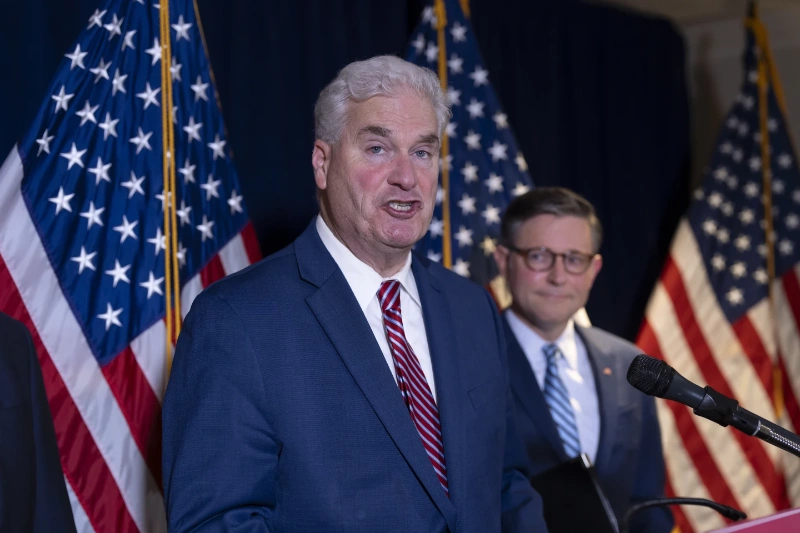Republicans dubbed it 'Crypto Week' in the House, but things aren’t going smoothly

Three bills about cryptocurrencies that were anticipated to pass the House this week came to a standstill on Tuesday when a group of Republicans unexpectedly allied with Democrats to block the legislation's debate and vote.
The House's alleged "crypto week" came to a halt due to a procedural error, which also hurt President Donald Trump, who had pushed Republicans to approve the measures as part of his effort to establish the United States as the "crypto capital of the world."
Trump seemed to put the bills back on track when he stepped in during a late-night meeting with Republicans at the White House. He stated on social media that he anticipated receiving votes by Wednesday at the latest.
A procedural vote required to bring the crypto legislation to the floor was opposed by 13 Republicans in addition to all Democrats. Speaker Mike Johnson informed reporters that talks between the House, Senate, and White House were in progress and that it was simply a part of the "legislative process." He proposed that they give it another go on Tuesday night.
"Time is of the essence on this, so we thought it was important to put it on the floor to advance it even though we expected there might be some 'no' votes," Johnson said. So pay attention. Over the following few hours, we will have a lot of conversations.
However, House leadership canceled the rest of the day's votes a few hours later, which might have put the cryptocurrency proposals in limbo.
Trump then announced on social media late at night that he was meeting with congressmen at the White House and had gained their backing to vote in favor of the procedural move.
About the step, Trump said on social media, "I am in the Oval Office with 11 of the 12 Congressmen/women necessary to pass the GENIUS Act and, after a short discussion, they have all agreed to vote tomorrow morning in favor of the Rule."
Johnson attended over the phone, according to the president, "and looks forward to taking the Vote as early as possible."
Along with much more comprehensive measures intended to address the bitcoin market structure, the blocked legislation also includes a Senate-passed bill to regulate stablecoins, a type of cryptocurrency. The Federal Reserve would not be allowed to issue a digital currency as a central bank under another bill.
How the three laws would be passed is the main point of contention, preventing the bills from moving forward. "Some of these guys insist that it needs to be all in one package," Johnson clarified. Since the Senate has only considered one of the three legislation thus far, packaging the bills would necessitate their return to the chamber.
Republican co-sponsor of one of the cryptocurrency bills, Rep. Glenn Thompson of Pennsylvania, told reporters that some Republicans wanted to bundle the bills together because they "didn't have a lot of faith in the Senate moving our legislation."
In order for the stablecoin legislation to reach Trump's desk for his signature prior to an August recess, Trump and Republican leaders have urged the House to pass each bill separately. The more comprehensive market structure legislation is anticipated to take even longer to approve than the stablecoin law, which took the Senate about a month and a half to complete.
That afternoon, Trump had urged Republicans to support the crypto measures, stating that "all Republicans should vote 'yes.'" Trump told reporters that Republicans who voted against the plan wanted it to be "stronger" when they questioned him about it Tuesday night.
Trump and his family stand to gain from a stablecoin surge, which is why he has worked so hard to get the stablecoin legislation passed. They control a sizable portion of World Liberty Financial, a cryptocurrency initiative that just introduced USD1, its stablecoin.
A clause that prohibits members of Congress and their families from making money off of stablecoins is included in the stablecoin legislation that the Senate passed. Notably, however, despite Trump's establishment of what some have dubbed a crypto empire from the White House, neither the president nor his family is subject to that limitation.
The cryptocurrency industry anticipates that the bills taken together will support its efforts to gain legitimacy and boost customer confidence. Furthermore, after investing heavily in the 2024 election to win a large number of lawmakers who support cryptocurrency, setbacks like the ones that occurred Tuesday might not have been anticipated.
On social media, Shirzad stated, "We'll see in these moments who is trying to get pro-crypto legislation done and who is not."
The 2026 midterm elections may be affected if the laws are passed. More than $140 million is already in the bank, ready to be used for midterm elections, according to Fairshake, a cryptocurrency super PAC.
"Last year's voters made it very clear that Congress must stop using cryptocurrency as a political tool and finally enact responsible regulation," said Josh Vlasto, a Fairshake spokeswoman. "To make sure that pro-crypto voices are heard in important races across the nation, we are developing an aggressive, focused strategy for next year."